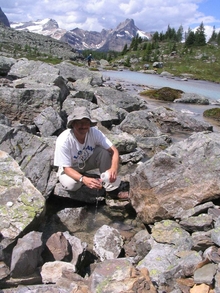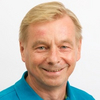Department Water Resources and Drinking Water
Hydrogeology
The research group Hydrogeology tackles the pressing regional and increasingly global challenges which affect groundwater and its protection as a natural resource. Scientific studies into the preliminary and follow-up protection of groundwater always take social and economic aspects into account. The group's regional activities include aspects of prealpine and alpine hydrogeology, global change, groundwater and surface water interactions, the passive and semi-passive remediation of large aquifers and the problems of groundwater in urban areas. Since the supply of drinking water will be one of the world's biggest challenges in the 21st century, the group also develops strategies for sustainable water supply in arid/semiarid areas and megacities. In this respect, an additional main focus of our work are investigations of groundwater quantity and quality changes due to revitalization of rivers.
Key research areas
- groundwater - surface water interactions
- prealpine and alpine hydrogeology
- urban hydrogeology
- remediation strategies for regionally contaminated aquifers (including natural attenuation, enhanced natural attenuation, permeable reactive barriers)
- integrated water- and soil management
Main focus and methods
- urban and alpine water cycle
- numerical flow and reactive transport modelling
- modelling of water cycle
- scaling of parameters
- hydrogeological investigation and monitoring methods
- passive and depth-discrete groundwater sampling
- field experiments incl. tracer, slug and pumping tests
- geothermal heat transport in groundwater
- water in arid and semi-arid areas
PhD school Water Earth Systems
Eawag and in particular the Department Water Resources and Drinking Water (W+T) is actively participating in the PhD School Water Earth Systems (WES). The aim of the PhD school is to provide a stimulating research environment for students working on the water-related topics in various earth systems. For more information please contact Mario Schirmer.
Timelapse Thur Niederneunforn TG
In the framework of the RECORD Catchment project, we installed webcams at our study site in Niederneunforn/Altikon at a restored river section of the river Thur in 2016/17. If you are interested in getting some pictures please contact: Reto Britt
Groundwater App
In the Groundwater App, in three short chapters you learn, how groundwater originates, how we use it and why there is a link to rivers. Furthermore you can do experiments in the groundwater lab. Here you can increase your knowledge about the behavior of groundwater.The application is available for free in the android and iOS appstores. The concept for this app was developed in the framework of the final thesis for becoming a Master of Arts in Design at the Zurich University of Arts (ZHdK), advised by the Eawag and financed by the Amt für Umwelt des Kanton Thurgau and the Swiss Gas and Water Industry Association. Target audience are adolescents from the age of 10 on. The app is available in English, German, French and Italian.
Project - MC-ITN HypoTRAIN
The Leibniz-Institute of Freshwater Ecology and Inland Fisheries (IGB) is lead of the EU funded project HypoTRAIN (Hyporheic Zone Processes – A training network for enhancing the understanding of complex physical, chemical and biological process interactions). 16 PhD students all over Europe are currently working on individual sub-projects. The general topic is the degradation of micropollutants in river sediments (the so called hyporheic zones). The PhD students’ individual sub-projects are related to a lot of disciplines, like hydrology, biology, ecology, biogeochemistry, and modeling. In the video some of the doctoral candidates give an insight into their work.
Eawag is part of this training network and hosts 3 PhD students Andrea Betterle and Andrea Popp (Dep. W&T) and Jonas Mechelke (Dep. UChem).
Project - Water Distribution
Large-scale alterations of the hydrological cycle have dramatically altered the natural runoff and recharge characteristic of many rivers, making the management, supply, and protection of freshwater resources a complex, albeit important topic. In order to develop catchment‐wide solutions for predicting water surplus and shortage, it is necessary to understand how the overall hydrogeological system works. Conceptualizing the physical and chemical balance between surface water and groundwater holistically is crucial for the sustainable utilization and management of freshwater resources. For this, data, models and real-time monitoring systems are the key ingredients in the process of understanding and prediction, and subsequent improved management
This SNF funded project is looking at water distribution within the Thur River catchment, Switzerland. The project focuses on the management and development of an existing data platform (RECORD Catchment, FOEN, and Cantonal) for water quality and quantity, and the development of adaptive and event-based monitoring schemes for water characteristics. In this project, some of the decisions on experimental design will be based on the results of model development with the objective of developing a semi-distributed model based on areas of hydrological similarity (Hydrological Response Units - HRUs) for the purpose of determining water balance on a supra-regional scale.
Project - MC-ITN INSPIRATION
The INSPIRATION project aims to develop the tools and framework required for sustainable agricultural intensification and urban development in Europe. The project encompasses an innovative training network (ITN) consisting of 15 early-stage researcher (PhD positions) at various institutions in the UK, Ireland, Poland, Belgium, the Netherlands, Germany and Switzerland, as well as industrial and scientific expertise provided by a number of non-academic partner organizations. Declared targets of the program include the evaluation of technological innovations and methods to manage environmental impacts as well as the development and application of novel monitoring and prediction approaches.
In the course of this project, the Hydrogeology group (Dep. W+T) hosts two early-stage researchers tasked with the development of an adaptive monitoring scheme for a catchment in the canton of Zurich. The development and application of a low range wireless sensor network for target contaminants (Robin Weatherl) will be supported by, and feed into, the creation of a flow and reactive transport model (Maximilian Ramgraber). The information derived from this work should aid decision makers everywhere seeking to develop sustainable land use and water practices.
Project - Record Catchment (Restored Corridor Dynamics)
Assessment and Modeling of Coupled Ecological and Hydrological Dynamics in the Restored Corridor of a River
River restoration is an essential tool to achieve "good ecological status” of water courses as required by European and Swiss legislation. Although the number of restoration projects has increased in recent years, scientific understanding of the underlying principles determining how hydromorphological variability in restored corridors of rivers relates to
- ecosystem functioning,
- biodiversity and
- water quality
is still limited. Our objective is to increase mechanistic understanding of coupled hydrological and ecological processes in near-river corridors. For this purpose, we are
- instrumenting a restored and a channelized section of the Swiss River Thur as large-scale field experimental sites, where we will quantify how the relevant variables influence (ground)water quality, ecosystem functioning and biodiversity;
- performing controlled experiments at the field sites and in the lab;
- developing process-based models of coupled hydrological, biogeochemical and ecological processes, facilitating transfer to other river systems undergoing restoration.
Achievements from the projects RECORD (2007-2011) and RECORD Catchment (2012-2017)
Project - Swiss Experiment / OSPER
The project Swiss Experiment is a collabrative research platform des CCES (Competence Center for Environmental Sustainability) ot the ETH domain. Goal is the development and implementation of sensors and methods with focus on automatisation of
- data generation
- linking meta data and monitoring data,
- data processing (validation, interpretation) and
- data visualisation.
Visiting Scientist
Former Group Members
These People worked in the Hydrogeology Group:
- Basso Stefano
- Betterle Andrea
- Bretzler Anja
- Chittoor Viswanathan Vidhya
- Diem Samuel
- Doulatyari Behnam
- Frank Corinna
- Garcia Perez Maria
- Ghasemizade Mehdi
- Hoffmann Lisa
- Kurth Anne-Marie
- La Cecilia Daniele
- Minnig Morgane
- Popp Andrea
- Radny Dirk
- Ramgraber Max
- Vogt Tobias
- Von Freyberg Jana




